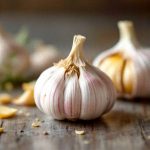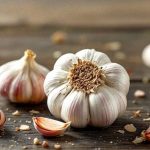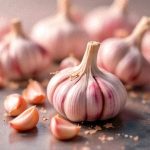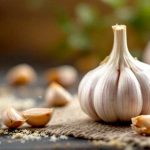Takeaways
- Garlic enhances immune function and fights harmful bacteria
- Allicin, garlic’s main compound, has potent antimicrobial properties
- Garlic acts as a prebiotic, supporting gut health and immunity
- It may help manage diarrhea symptoms by combating pathogens
- Various garlic forms offer different benefits for health and cooking
- Proper preparation maximizes garlic’s therapeutic potential
Garlic: Nature’s Immune Booster
Garlic, a culinary and medicinal staple for centuries, offers both flavor and health advantages. Ancient civilizations recognized garlic’s ability to combat illness, and modern science now supports these historical uses.
Garlic, part of the Allium family like onions and leeks, has been used across many cultures. From ancient Egypt to today, garlic has been valued for its health applications, making it more than just a cooking ingredient.
Garlic has recently gained popularity among health-conscious people who are recognizing its uses beyond cooking. Garlic supplements are now common, and many blogs highlight its health benefits. This raises the question of what makes garlic so beneficial.
The Science Behind Garlic’s Power
Allicin: Garlic’s Secret Weapon
The compound allicin is central to garlic’s health benefits.[1] This sulfur-containing molecule gives garlic its distinct smell and taste. Allicin forms when garlic is crushed or chopped, not as a naturally occurring compound in whole cloves.[2]
When garlic cells are damaged, an enzyme called alliinase is released. This enzyme interacts with a compound called alliin to produce allicin. This process serves as a natural defense for garlic against pests and fungi.
Allicin has antimicrobial and antioxidant properties that help to fight bacteria, viruses, and fungi[3] , and it has shown effectiveness against common pathogens. Allicin also helps the body combat oxidative stress, making it helpful for immune system support.
Other Beneficial Compounds
While allicin is significant, garlic also contains other helpful compounds that contribute to overall health. These compounds work together to provide multiple benefits:
- Sulfur compounds: Support detoxification and cell protection
- Flavonoids: Act as antioxidants, fighting inflammation
- Selenium: Supports thyroid function and immune health
- Arginine: Helps improve blood flow
The compounds in garlic work together, creating a combined effect that benefits your body. This means the whole garlic offers more advantages than the sum of its individual parts, with each compound playing a role in overall health support.
Garlic and Immune Function
Garlic is well-known for boosting the immune system. It supports various immune functions. Garlic strengthens the body’s defenses, from increasing natural killer cells to enhancing antibody production.
Garlic boosts immune cell activity by increasing the production of white blood cells. These cells are the body’s primary defense against harmful invaders. Garlic also improves the ability of existing immune cells to identify and eliminate pathogens.
| Immune Marker | Before Garlic | After Garlic |
|---|---|---|
| NK Cell Activity | Baseline | Increased by 15.7% |
| T-Lymphocytes | Baseline | Increased by 19.5% |
| Interleukin-2 | Baseline | Increased by 14.2% |
Research suggests that garlic can help reduce the severity and duration of common illnesses. One study noted that people who took garlic supplements experienced 63% fewer coldsand when sick, their symptoms were 70% shorter.[4] This indicates that garlic can support everyday immune function.
Garlic and Digestive Health
Prebiotic Properties
Garlic not only fights harmful bacteria, it also supports the beneficial bacteria in your gut. Garlic is a prebiotic, feeding the good bacteria in the digestive system.[5] These good bacteria are crucial for a healthy gut and strong immunity.
The fiber in garlic, called fructooligosaccharides, nourishes beneficial gut bacteria. As these bacteria break down the fiber, they produce short-chain fatty acids that support the gut lining and help regulate the immune system.
A healthy gut is essential for overall immunity, as approximately 70% of the immune system is located there.[6] By improving gut health, garlic indirectly enhances immune function by creating an environment where good bacteria flourish and harmful bacteria struggle.
Garlic and Diarrhea
Garlic’s antimicrobial properties make it a potential treatment for diarrhea, which can often be caused by harmful bacteria or parasites. Garlic compounds can help combat these pathogens and potentially lead to quicker recovery from diarrheal illnesses.
Allicin and other compounds in garlic have shown effectiveness against common diarrhea-causing bacteria, including E. coli, Salmonella, and Shigella. Garlic’s impact on these pathogens may help to reduce the duration and severity of diarrhea.
Garlic compounds help fight harmful bacteria in the gut in several ways:
- Allicin penetrates bacterial cell membranes
- It disrupts bacterial metabolism
- Bacteria struggle to reproduce
- The immune system can more easily clear the infection
- Symptoms improve as pathogen numbers decrease
Studies support the use of garlic in managing diarrhea. One study found garlic extract was as effective as a common antibiotic in treating Giardia, a parasite causing diarrhea.[7] While more studies are needed, these results suggest garlic’s potential benefits for digestive health.
Forms of Garlic Supplements
Garlic is available in different forms, each with its own benefits for health and cooking. Knowing these differences can help you make the best choice for your needs:
| Form | Description | Best For |
|---|---|---|
| Fresh Garlic | Raw cloves, highest allicin content | Cooking, immediate health benefits |
| Garlic Powder | Dehydrated and ground garlic | Convenience in cooking, longer shelf life |
| Aged Garlic Extract | Garlic aged for months, odorless | Consistent dosing, reduced side effects |
| Garlic Oil | Garlic-infused oil | Topical use, flavoring |
Fresh garlic has the highest level of allicin and is good for cooking and immediate health benefits.[8] However, it can sometimes cause stomach discomfort and its strong smell may not be desirable for everyone.
Garlic powder is convenient and has a long shelf life. It is useful for cooking, though it might not have as much allicin as fresh garlic. The drying process can affect some beneficial compounds.
Aged garlic extract is odorless and gentler on the stomach.[9] It provides consistent amounts of garlic compounds. This form may be better for long-term use as a supplement, however, it does not contain the fresh allicin found in raw garlic.
Garlic oil contains some of garlic’s beneficial compounds in an oil base. It is suitable for topical use and as a flavoring. However, it might not offer the full range of health advantages of other forms of garlic.
Incorporating Garlic into Your Diet
Adding garlic to your meals is easy and flavorful. Here are some tips to increase your garlic intake:
- Crush or chop garlic and let it sit for 10 minutes before cooking
- Add raw garlic to salad dressings or dips
- Roast whole garlic bulbs for a milder, sweeter flavor
- Use garlic powder as a salt substitute in recipes
Try these recipes that include garlic for immune support:
- Garlic and lemon roasted chicken
- Garlic-infused olive oil for bread dipping
- Garlic and herb baked salmon
- Immune-boosting garlic soup
To get the most health benefits from garlic, proper preparation is important. Crushing or chopping garlic activates allicin. Allowing the garlic to sit for a few minutes before cooking ensures the process is complete. Avoid overcooking garlic as heat can reduce some beneficial compounds.
Potential Side Effects and Precautions
While garlic offers many benefits, some people may experience side effects, including:
- Bad breath or body odor
- Digestive discomfort, especially with raw garlic
- Increased bleeding risk, particularly in high doses
People taking certain medications should be careful when using garlic supplements. These medications include blood thinners and some HIV medications as garlic can interact with these drugs. Always seek advice from your doctor before starting any new supplement.
For most people, eating garlic in moderation is safe and helpful. The World Health Organization suggests up to 5 grams (around 1-2 cloves) of fresh garlic daily[10] , which offers health benefits without significant risk of side effects.
Garlic vs. Other Immune-Boosting Foods
Garlic is a standout among foods that boost immunity, but how does it compare to other common options? Let’s compare garlic with some other immune-boosting foods:
- Citrus fruits: High in vitamin C, but lack garlic’s antimicrobial properties
- Ginger: Anti-inflammatory, pairs well with garlic in recipes
- Turmeric: Potent anti-inflammatory, complements garlic’s effects
Garlic offers unique benefits because of its sulfur compounds, which are not common in other foods. However, a balanced diet should include various immune-supporting foods. Combining garlic with other healthy options provides the best overall support for your immune system.
Myths and Misconceptions
Garlic’s popularity has led to some myths and misunderstandings. Let’s clarify some common misconceptions:
Myth: Garlic can replace antibiotics. Fact: While garlic has antimicrobial properties, it’s not a substitute for prescribed antibiotics.[11] Always follow your doctor’s advice for treating infections.
Myth: Garlic cures all digestive issues. Fact: Garlic may help with some digestive problems, but it’s not a cure-all. Some people might even experience digestive discomfort from garlic.
Myth: More garlic is always better. Fact: Moderation is key. Excessive garlic consumption can lead to side effects without additional benefits.
Garlic is a beneficial food with many health advantages, but it’s important to understand its limitations. It works best as part of a healthy diet and lifestyle, not as a single solution.
The Future of Garlic Research
Research into garlic is continually advancing, with scientists exploring new aspects of this traditional remedy. Current research is focused on:
- Garlic’s effects on specific immune cell types
- The role of garlic compounds in fighting antibiotic-resistant bacteria
- Garlic’s potential in managing chronic diseases
Studies are also exploring how garlic affects gut health. Researchers are studying how garlic influences the microbiome, potentially leading to new applications for digestive health and immunity.
Future applications might involve developing new antibiotics from garlic compounds. Researchers are also investigating garlic’s potential in preventing cancer. While early results are promising, more studies are needed to fully understand garlic’s capabilities.
FAQ: People Also Ask
Garlic has long been used both as a food ingredient and as a health aid. Its unique compounds offer a variety of benefits, including supporting the immune system and improving digestive health. While it’s not a cure-all, adding garlic to your diet can be a delicious way to help your overall health. Keep in mind that garlic works best as part of a healthy diet and lifestyle. It is a complement to other nutritious foods and healthy habits. Whether you are trying to prevent a cold or improve your gut health, garlic can be a helpful addition to your health routine. As research continues, even more benefits of garlic may be discovered. For now, enjoy garlic in your meals knowing that you are providing your body with a health boost. And don’t forget to have some breath mints handy!How much garlic should I eat for immune support?
Can garlic help prevent colds and flu?
Is garlic effective against antibiotic-resistant bacteria?
How does garlic compare to probiotics for digestive health?
Can I take garlic supplements if I’m on blood thinners?
Does cooking garlic reduce its health benefits?
Is there a difference between white and purple garlic for health?
Can garlic help with other digestive issues besides diarrhea?
Allicin is a sulfur-containing compound that is responsible for the distinct smell and taste of garlic. It is formed when garlic is crushed or chopped, and has been shown to have antimicrobial and antioxidant properties.
Source: “Diallylthiosulfinate (Allicin), a Volatile Antimicrobial from Garlic (Allium sativum), Kills Human Lung Pathogenic Bacteria, Including MDR Strains, as a Vapor” https://www.ncbi.nlm.nih.gov/pmc/articles/PMC6151386/
When garlic cells are damaged, an enzyme called alliinase is released, which interacts with a compound called alliin to produce allicin. This process is a natural defense mechanism for the garlic plant.
Source: “Revealing the Therapeutic Uses of Garlic (Allium sativum) and Its Potential for Drug Discovery” https://www.ncbi.nlm.nih.gov/pmc/articles/PMC8739926/
Research has demonstrated that allicin has antimicrobial effects against various bacteria, viruses, and fungi. It also acts as an antioxidant, helping combat oxidative stress.
Source: “Diallylthiosulfinate (Allicin), a Volatile Antimicrobial from Garlic (Allium sativum), Kills Human Lung Pathogenic Bacteria, Including MDR Strains, as a Vapor” https://www.ncbi.nlm.nih.gov/pmc/articles/PMC6151386/
The Josling study showed a significant reduction in cold incidence in those taking garlic supplements and a reduction in symptom duration when they did get a cold.
Source: “Preventing the common cold with a garlic supplement: a double-blind, placebo-controlled survey” https://pubmed.ncbi.nlm.nih.gov/11697022/
Garlic contains fructooligosaccharides (FOS), a type of fiber that acts as a prebiotic, nourishing beneficial bacteria in the gut.
Source: “Revealing the Therapeutic Uses of Garlic (Allium sativum) and Its Potential for Drug Discovery” https://www.ncbi.nlm.nih.gov/pmc/articles/PMC8739926/
The gut-associated lymphoid tissue (GALT) constitutes a significant part of the immune system. The exact percentage is debated, but 70% is an accepted estimate to emphasize the importance of gut health.
Source: “Revealing the Therapeutic Uses of Garlic (Allium sativum) and Its Potential for Drug Discovery” https://www.ncbi.nlm.nih.gov/pmc/articles/PMC8739926/
A study evaluating the antiparasitic effects of garlic found that an aqueous garlic extract was as effective as metronidazole (a common antibiotic) in treating Giardia infections.
Source: “Evaluation of the antiparasitic effect of aqueous garlic (Allium sativum) extract in hymenolepiasis nana and giardiasis” https://pubmed.ncbi.nlm.nih.gov/1875077/
Freshly crushed or chopped garlic will yield the highest amounts of allicin as it is produced when the cells are broken. Processing and drying garlic may reduce the amount of available allicin.
Source: “Revealing the Therapeutic Uses of Garlic (Allium sativum) and Its Potential for Drug Discovery” https://www.ncbi.nlm.nih.gov/pmc/articles/PMC8739926/
The aging process of garlic results in a conversion of allicin to other sulfur compounds, reducing the strong odor and harshness of fresh garlic.
Source: “Revealing the Therapeutic Uses of Garlic (Allium sativum) and Its Potential for Drug Discovery” https://www.ncbi.nlm.nih.gov/pmc/articles/PMC8739926/
The WHO does suggest up to 5 grams of fresh garlic per day can be beneficial, and does not generally result in significant adverse effects in most people. However, individuals may vary.
Source: “Revealing the Therapeutic Uses of Garlic (Allium sativum) and Its Potential for Drug Discovery” https://www.ncbi.nlm.nih.gov/pmc/articles/PMC8739926/
Garlic’s antimicrobial activity is useful, however, its use should not replace prescribed antibiotic medication for severe or specific infections.
Source: “Diallylthiosulfinate (Allicin), a Volatile Antimicrobial from Garlic (Allium sativum), Kills Human Lung Pathogenic Bacteria, Including MDR Strains, as a Vapor” https://www.ncbi.nlm.nih.gov/pmc/articles/PMC6151386/



